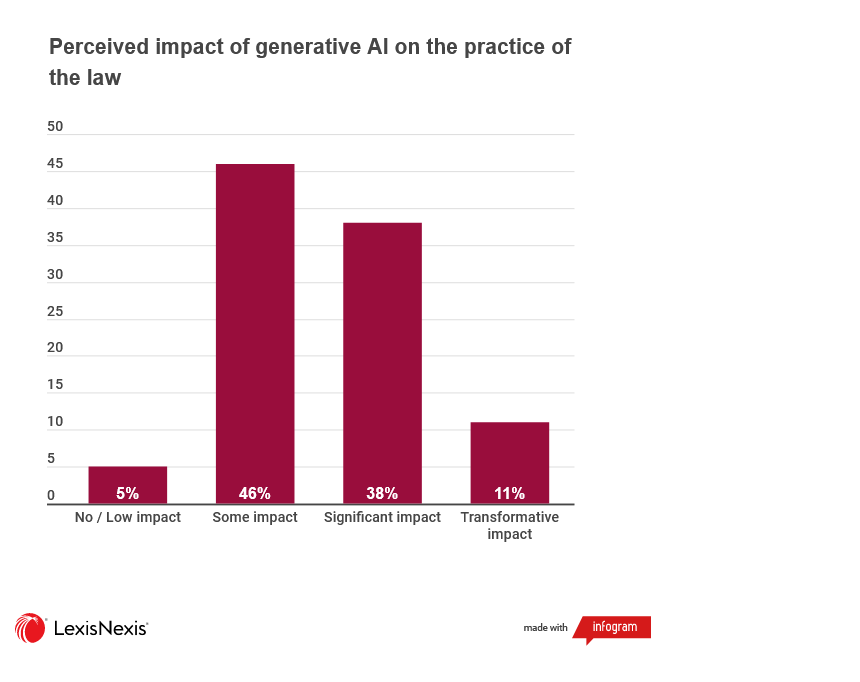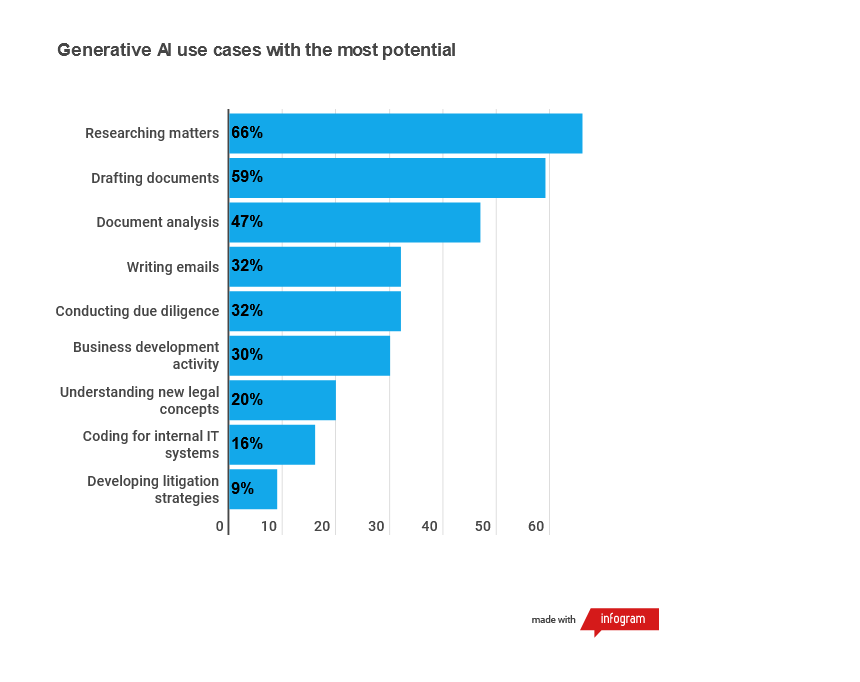Legal Tech Industry Likely to Become a Big Avenue for Generative AI Tools
A large percentage of in-house legal counsels are either expecting their firms (70%) or their clients (55%) to use AI.
Legal tech users are aware of the disruptive forces that influence innovation, research and development in their industry. Awareness of generative AI tools is likely to have a significant impact on the global and regional law firms. Traditionally, legal tech users have been always at the forefront of digital transformation journeys, adopting newer capabilities for various operations. But, working with tools such as OpenAI’s ChatGPT and Google’s BARD is a complex challenge for legal firms, especially when there is a severe dearth of training and AI upskilling. These could have an ever-lasting impact on the entire legal tech industry, spinning ground-breaking disruptions for every player. How big would be generative AI’s impact on the legal industry?
LexisNexis Legal & Professional’s new report entitled “Generative AI and the future of the legal profession” highlights a visible disconnect between the expectations of various stakeholders in the legal landscape. According to the new report, 87% of legal professionals have heard about at least one generative AI tool, such as ChatGPT. The sentiment toward AI and other cutting-edge capabilities varies among law practitioners. For example, only 14% of firms think generative AI would have a ‘positive’ impact on their legal practice. In contrast, 8% of respondents see AI having a ‘negative’ impact on their existing practices. 67% of firms have a mixed feeling toward any kind of generative AI involvement.
95% of UK-based legal professionals cited the noticeable impact of generative AI tools on their current practice. A large percentage of in-house legal counsels are either expecting their firms (70%) or their clients (55%) to use AI. Legal firms and in-house counsels could use generative AI tools differently — but the whole AI-directed processes would be more or less aligned to the same set of goals and objectives. As legals firms get familiar with generative AI tools and prompts, they would confide in experimenting and developing new use cases for various legal tech applications. Generative AI adoption could be sluggish in some areas within legal firms where compliance and regulations take priority over ease of use and quick results. Nonetheless, law firms could accelerate their AI use in the next 12 months. 49% of in-house counsels predict that law firms could be using generative AI tools in the next 12 months; 11% believe AI’s use is already a sizeable part of the existing legal processes.

For some, it’s too early to be trusting AI.
At best, AI is still light years away from being perfect, and therefore, it’s best avoided to reduce risks and prevent damage to reputation. Though generative AI tools can make legal firms more efficient and time-savvy, 8% of legal professionals want to stay clear of AI’s involvement in their work. 24% of firms squarely point to a situation where clients may not want to implement AI tools in their cases. Larger and mid-sized law firms are currently researching and exploring generative AI opportunities in areas related to text summarization, content moderation, generation, and other time-consuming activities.
Use of Generative AI Tools in Legal Firms
- Research work (66%)
- Briefing documents (59%)
- Analyzing contracts and legal papers (47%)
- Conducting due diligence (46%)
- Setting up business development activities (40%)

Other prominent uses of generative AI in law and legal practice are:
- legal analytics
- predictive intelligence
- automated billing and payment collections
- self-service automated ERP
- enterprise content management
- portfolio review and investigation
- risk management
- data privacy and governance
- digital forensics
Alison Rees-Blanchard,” head of TMT legal guidance at LexisNexis said,“When freely available AI tools don’t have access to the relevant data, they have a tendency to make up the answers, or hallucinate. This means any generated output must be checked thoroughly. However, a closed data source means that hallucinations will be easier to identify, as verification of the output is made easier.”
It makes sense to get started with the generative AI tools immediately. However, 40% of in-house counsels in legal firms expect their organizations to start working with generative AI in the next 3 years. 26% of respondents expect their firms could start with ChatGPT or others in the next 12 months. A delay in making decisions on generative AI investments could cost legal firms both time as well as efficiency, hindering customer service management and other critical business-centric operations.
Conclusion
The adoption of AI in legal practice can be a huge boost to the industry. However, the risks of blindly relying on AI and machine learning capabilities can’t be avoided. AI can do a lot of things, but expecting it to advocate, negotiate or manage complex litigation is too much today. If left unsupervised, AI-generated content could create more problems for legal firms and their clients than what it were actually meant to solve. While different sources report that 25-30% of lawyers’ jobs could be automated completely by in the next 5 years, it’s still early days where AI can force its way into legal practices as a competent authority and support.

Comments are closed.